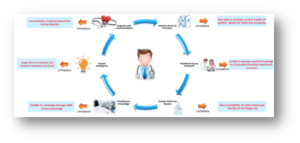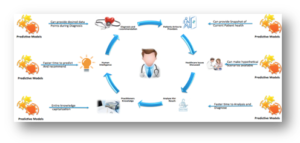Every one of us must have visited Healthcare Practitioners or Providers in past, demanding best possible diagnosis and treatment outcomes. In the process of receiving medical assistance, we presume healthcare providers and doctors to be super humans, assuming them to provide flawless diagnosis every single time. In reality (and unfortunately), this is not what gets delivered to us – as for most of the time, it is too much to ask for a healthcare provider to match our expectations.
There is no doubt that experienced Healthcare Providers and Physician Practitioners are extremely knowledgable, very well read and fully trained to handle their expertise area. But for a practitioner to synthesize complete medical knowledge while treating their patient is a supreme ask. Moreover, Providers will not have all the desired data points at their fingertips needed to compare treatment outcomes. Even if they have access to the massive amounts of historical data points, they would still need time and expertise to analyze available information to be able to integrate them with the patient’s medical profile, resulting in gap between treatment expectation and actual outcomes. More often than not, this gap leads to situations like diagnosis errors and delays, patient readmissions, in-efficient practitioner occupancy, claim management issues and many more.
So, inspite of healthcare providers trying their best, a perfect healthcare service with 100% accuracy would be very tough ask. Looking at the rate with which healthcare sector is growing, gaps between expectations and outcomes will continue to grow which will further strengthen limitations that we already have been living with.
How Predictive Analytics is playing an ‘enablers’ role –
The burning need of efficient healthcare service creates tremendous technology opportunities. If used appropriately, supporting technologies can be used as an enabler for healthcare sector to bridge existing gaps of expectations and outcomes. Predictive and Statistical Analytics is one of similar technology enabler, which, when used with Healthcare practice, could significantly enhance patient experience, by delivering optimum medical treatments across healthcare services including Personalized care, Population health Management etc.
Predictive analytics uses statistical algorithms blended with technology platforms to find hidden associations and relationship between different parameters of historical records. In a healthcare environment, this method can be used to deliver optimum healthcare analysis outcomes by deciphering patients historical records with past treatment data, similar patient treatment outcomes, historical medical transactions, published (latest) medical research and publicly available Electronic Health Record. This level of medical analysis helps identify hidden insights that can be used to predict outcomes of individual patients, revealing surprising associations between information and outcomes that our human brains would never be able to suspect.
Beyond gaining deep insights within healthcare service, Predictive Analytics can also be integrated with healthcare sector for optimization of day to day activities across all channel of Patient Care Management cycle. Following figure depicts the current process of a typical Healthcare Cycle, Challenges faced on each part of the cycle and how Predictive Analytics will be able to help overcome these existing challenges at individual stage of the cycle:

Figure 1: A typical cycle for Patient Care Management with current issues

Figure 2: Predictive Analytics as an enabler to address existing issues with Patient Care Management
Predictive Analytics is still an evolving technology, however, recent availability of healthcare information and dataset in abundance creates massive opportunity for the technology to become an integrated solution partner for healthcare services. Below are some of the tangible opportiunities that will require encapsulation of Predictive and Statistical analytics in the field of Healthcare Services:
- Leverage 100% medical Knowledge for all possible (including Hypothesis) scenarios: Machine can store and use complete healthcare knowledge.
- Have desired data points during diagnosis: Machine will store all the historical information forbetter Analysis
- Much Smaller execution time to compare treatment outcomes for all the diseases they encounter: Faster and accurate Machine Algorthhms
- Machine Learning : Using cognitive analytics to learn from previous diagnosis experience and act accordingly
- Artificial Intelligence: Leverage human intellegince for better diagnosos process and recommendations
Adoption Challenges and overcoming them:
The sometimes not-so-obvious irony is that without having the proper technology framework in place, new technology (Predictive Analytics in this case) cant be completely relied upon. The technology of Predictive Analytics has been around for some time now, but means to deliver and interpret actionable data has yet to be fully developed and is still evolving. To add to it, with lack of proper infrastructure and skilled resource to act on predicted results, we fall short of the full potential of harnessing historic trends and patterns in patient data.
Also, with inception of new technologies and implementation methods, it is difficult to buy in healthcare practitioners approval to integrate Predictive Analytics Technology within their day-to-day transactional system. Without the willpower for clinical intervention, any predictor – no matter how good – is not fully utilized. Having said that, healthcare industry is decades behind other consumer-oriented businesses in using analytics to anticipate future needs which creates an overwhelming opportunity for Predictive and Statistical Analytics to become an integral part of Healthcare service offerings as the technology continues to evolve.
Case in Point:
Opportunities of using Predictive Analytics in Healthcare sector are huge, assuming that in coming months/years, there will be new and innovative methods of overcoming integration challenges. Some of the promising case in point that could benefit healthcare industry by using Predictive Analytics Technology as enablers are:
Case 1: Lower Patient Re-Admissions:
- Predicting health outcomes of patients based on historical results and data points
- Forecasting futuristic health hazard by classification of multiple patient records
- Predictive models to Identify apt healthcare process based on past success
Case 2: Population Health Management
- Predictive Models to track healthy patients but could become unhealthy in future
- Logical aggregation of patient data across multiple health information technology resources
- Analysis of that data into a single, actionable patient record
Case 3: Optimization of Providers (doctors) availability
- Better allocation of Providers/Doctors for patients
- Predictive Models built for disease categorization
Looking Ahead:
An honest perception about encapsulating new and emerging technologies (Predictive Analytics in this case) is surely not going to be a smooth sail, however, there are many benefits that can be utilized by adequate and appropriate amalgamation of Predictive and Statistical Analytics within Healthcare industry as pointed above. If associated challenges can be overcome, following are some of the advantages that Healthcare Industry will benefit with by using Predictive and Statistical analytics as an enabler to Healthcare industry worldwide:
- Better Medical Diagnostic Accuracy
- Faster time to Diagnose
- Future predictions of Unknowns
- Efficient usage of Historical Records
- Better hypothesis outcomes
- Correlation with other patient records (BIG Data) and outcomes
- Allows researchers to develop models for pre-defining outcomes
Opportunities of using Predictive Analytics in Healthcare sector are huge, assuming that in the coming future, there will be new and innovative methods of overcoming integration challenges.
Authored by Neeraj Pandey, AVP – Enterprise Analytics Group, Infinite Computer Solutions




